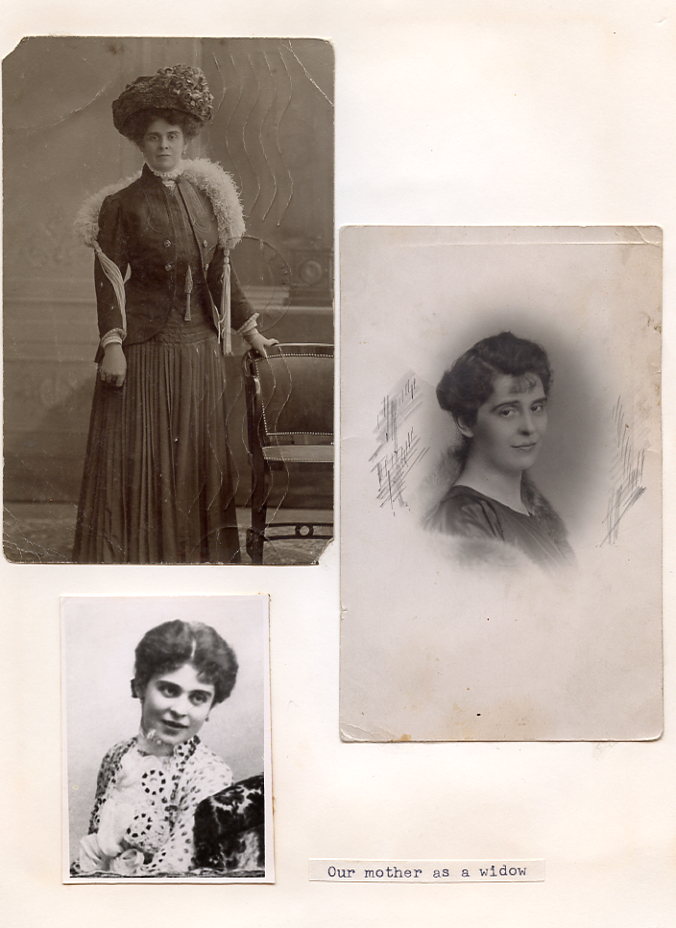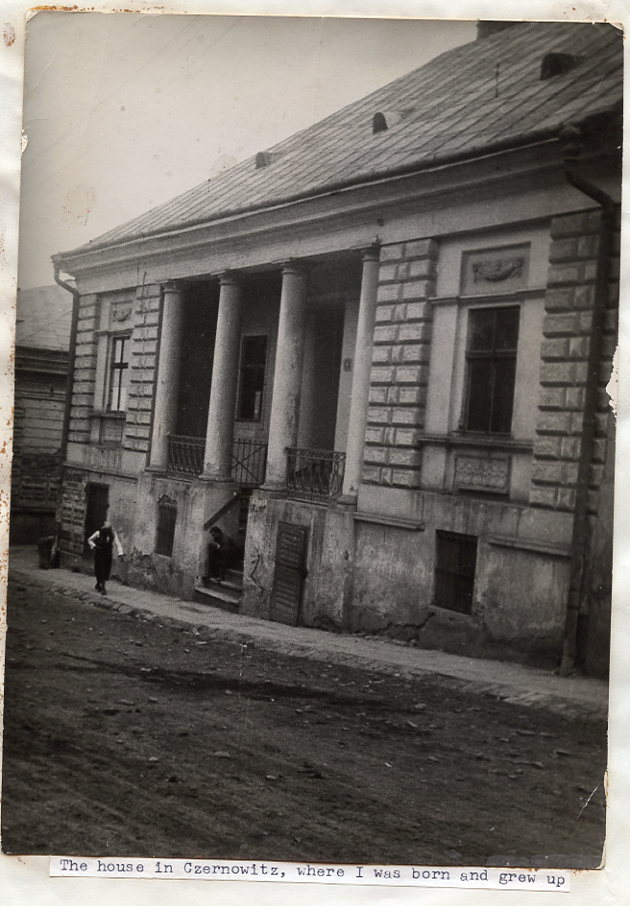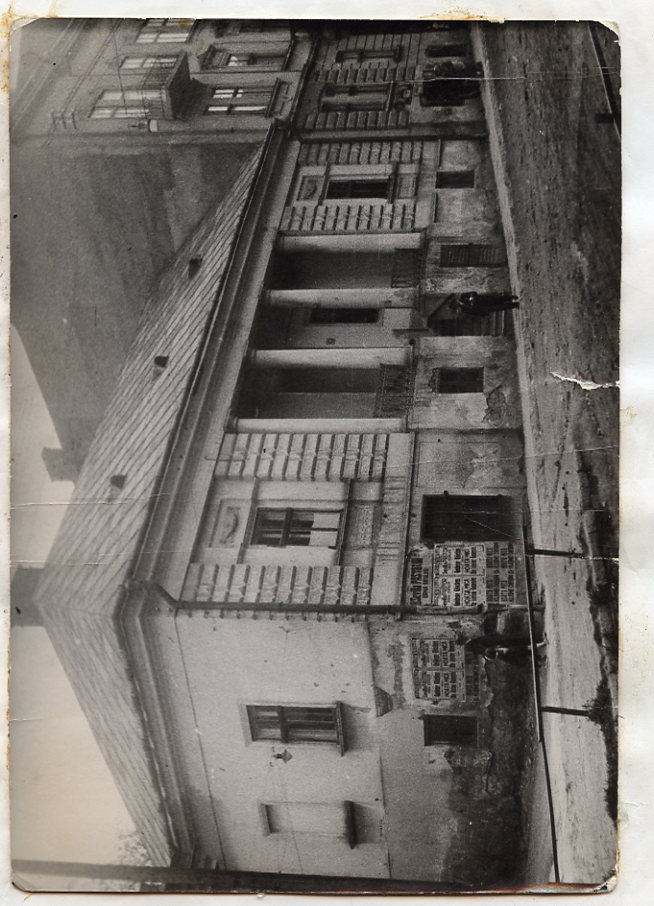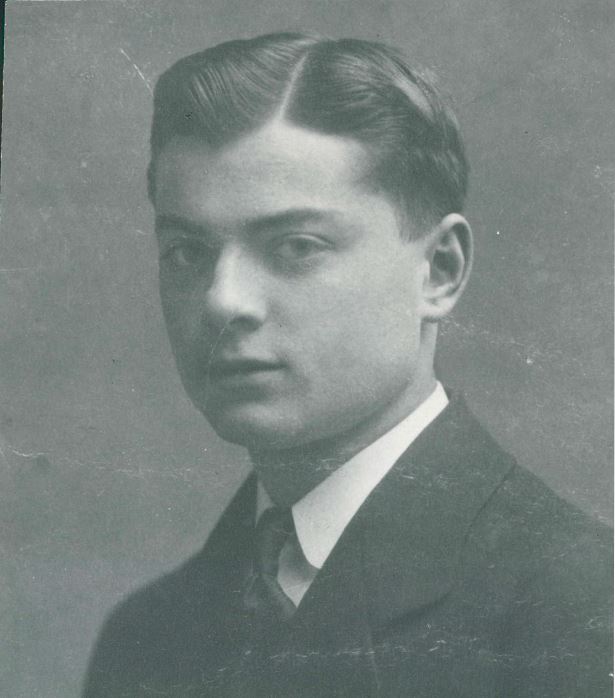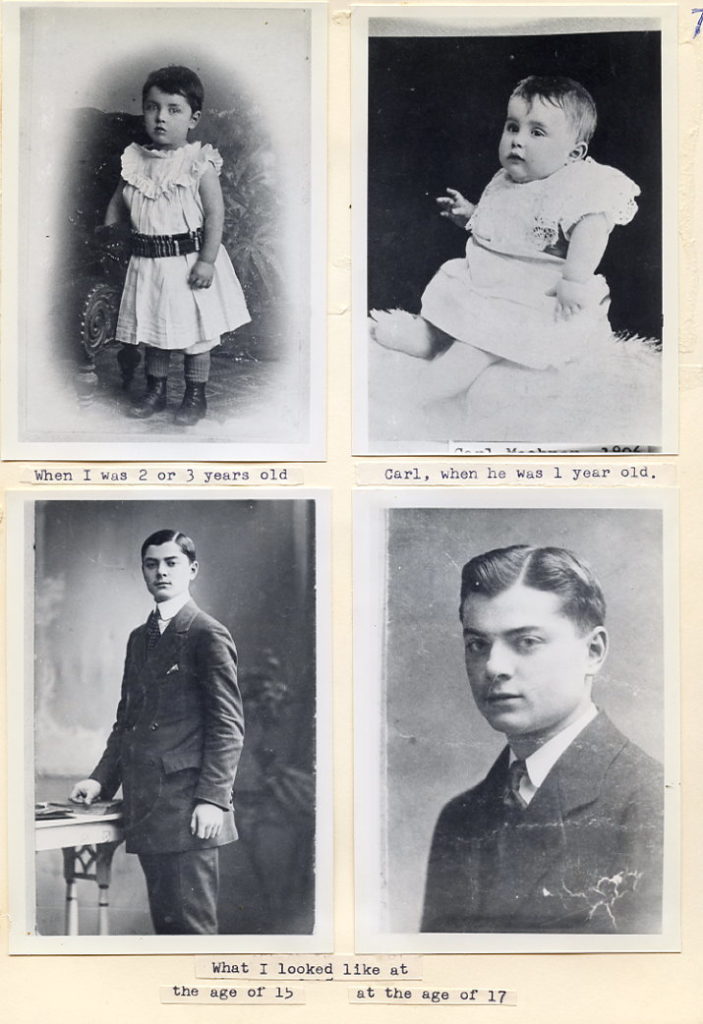1897
My mother returned to the home of her parents in Czernowitz with her two children. She was only 25 years old, when she became a widow, I was born 8 days later, and I was later told that everybody was very unhappy that she had another child. But I was very cute, they said, and I was very well treated and everybody loved me. My mother got her own apartment in the house of my grandparents, in which we grew up and lived for many years.
It was a beautiful house and I have a picture of it which shows only the front and it looks like a small house but it was in reality quite a big house. My grandparents lived on the upper floor on the right side, where there are two windows, one to the right, where there was the living room, and one between the 2 columns, where there was the bedroom. These 2 rooms were big rooms, and behind these rooms there were 2 more rooms, one bigger one, the dining room and another smaller room which we called salon, which had the windows to the yard. From the dining room, one had to walk 3 or 4 stairs up to a smaller room, and next to it was a large kitchen with a large closet. In the smaller room the salesman and the apprentices had their meals twice a day and where the maid slept at night, whereas the cook slept in the kitchen. This was the apartment of my grandparents. A similar apartment was on the left side of the house, except that it did not have the two last mentioned rooms, the smaller room and the kitchen. My mother and we 3 children got an apartment in the back, consisting of a kitchen and three rooms, with windows going to the yard. The apartment could be reached over a wooden gangway which we called “gang” which ran on three sides of the yard like a long balcony from which a staircase ran down to the yard. A plan, which I will draw, will explain the situation.
We loved the house. It looked beautiful from the street and we also loved our apartment. The first room next to the kitchen was the bedroom for us 3 children, the next room was rather small and there stood the piano, and the third room was my mother’s bedroom. To the left of our house there was a narrow street between our house, which had the No. 6 and the next house, which had the number 8, where there was the entrance to that house and to another house further in the back. It was a dead-end street, where there was at the end a fence of a garden. There was plenty of room for us children to play, our yard and next to it the dead-end street, which we called “das Gasserl”, which means little street. There was not only plenty of room to play, but there were also plenty of children. Below our apartment there lived a family with 5 children, and in the next house No. 8 there lived a few families with many children. Alltogether there were about 20 children, if not more, in these two houses, and plenty of noise. In our yard there was one very big acacia tree, which bloomed every year. Here I should mention that an organ-grinder came about once a week to play in our yard. He usually had a little monkey, a rhesus, sitting on top of his instrument on a long leash. We children used to stand around, and since the monkey was very friendly, we could take him in our arms or let him sit on our shoulders. We often had a few peanuts for him, and we gave the man, of course, a few hellers, which was then the money unit.
We were relatively well behaved children, and my mother was very strict with us, also our grandparents. Our evening meals we had together with the grandparents, and we had to sit quietly and did not talk, at least not loud. When the meal was over, my mother asked us to get up. Each of us went to the grandmother and kissed her hand, and we went with my mother to our apartment and to bed. But it was a rule that she played for us on the piano every evening, and we could ask her what to play. We liked for instance very much the Liszt “Hungarian Rhapsody No.2”, which she played beautifully. We also liked the “Sonate Pathetique” by Beethoven, “Fruehlingsrauschen” by Sinding, the “Ballade No.l” by Chopin, the “Rondo capriccioso” by Mendelssohn, and many other pieces, the names of which I don’t remember anymore. She played till we all were asleep.
When we went out with my mother, we wore sailor-blouses, which she had made herself, and sailor-caps, and short pants, which left the knees naked, even in winter. In winter, we went iceskating with her, every day. My mother was a good iceskater, a so-called figure-skater, and could also dance on the ice to the music. We boys were rather wild skaters, belonged to a group of boys, who played all kind of games on the ice, races, etc. I once broke my right ulna on the ice. Once I had a brain concussion and was carried unconscious into the clubhouse. But I regained consciousness very soon, and there were no after-effects. I was told that I was pushed down by two officers of the army, who were very wild skaters. I was a little boy then and had gotten into their way. We had very cold winters, with temperatures of minus 30 or 35 degrees Celsius. Nevertheless, winter meant much fun for us children. We all had sleighs, of course. Horse-drawn sleighs were generally used for transportation. We did not ski, did not even hear about skis, when we were children. Our street, the Tuerkengasse, had an incline, and on some days a great many children sleighed down all day long on their sleighs.
Our grammar school was at the corner of our street, and so we did not have to go far to school. Next to it was the girls school, where my sister Else went. I was a good pupil, but very shy, and my teachers liked me. I remember that on the first school day, my teacher, Miss Schuster, took my face between her hands and said: “What eyes”. She became a friend of my mother, and was often invited in the afternoon for coffee. I remember that I was once writing my home-work and Miss Schuster was in for coffee. I did not know it and I asked my mother for help. I asked her loud: “Mama, how much is 4 and 4?” and she answered “8”. Then I asked again: “How much is 3 and 4?” and now Miss Schuster answered and said: “Is that the way you do your home-work?” After that I did not ask anything anymore. My mother and Miss Schuster had a good laugh.
On Sundays, our grandfather took us often on trips. He ordered a coach with two horses, and we usually drove through the city to a place called “Die Buche” (the beechtree) near the second railway-station beyond the city. We went there, because there was a shady garden, where we could sit and get a glass of good buttermilk. Very often, he took us to the movies. There was a company, named Oeser, which had movie theatres in all bigger cities. It was, of course, a still-movie, and for the music there was a piano player. It was the time, before Asta Nielsen became famous, long before Charlie Chaplin.
I remember the day, when we could turn electric light on or off in our house. That was shortly after our grand mother had died, around the year 1906 or 1907. Up to that time, we had petroleum lamps in the house. That was a rather dim light and required daily cleaning of the glass cylinder, refilling of petroleum, and cutting carefully away the burnt rim of the wick. It was a wonderful thing to have all that changed, and to have brilliant electric light in every room, just by pushing or turning a switch. The telephone was also a great thing, but that came a little later, around 1916 or 1911. It was, of course, the old telephone, which can now be seen only in museums or antique shops, where one had to turn a crank, and then ask the operator to connect you with a certain number. A typewriter we also got a little later, around 1911 or 1912.
I remember the time, when the first automobile came to the city. Later, when we heard an auto rattling, we all shouted “an auto, an auto” and ran into the street and we saw it passing by. There were autos later on, which had one wheel in the front and two wheels in the back.
I remember, when the first airplane came to our city. It was announced long before it came. We knew about Bleriot, who was seen in other big cities. The man, who was to fly his plane in Czernowitz, was a Rumanian aviator, whose name was Vlaicu. Hundreds if not thousands of people went to a suburb, where there was a big flat field, to see him get into the air. He got up, but came down within a minute and landed in a potato field. The plane was not damaged, but a lot of soil went into the motor, and he could not fly anymore on that day, as the motor had to be cleaned. The next day, the show took place again, and this time it was a successful flight, and the plane circled a few times and landed well. That must have been in the year 1910 or 1911.
The playing in the street of us boys must have annoyed the people in our neighborhood. We liked to play croquet, but most of the time we played “cops and robbers” and ran wildly through the streets. We got into bad company, when a family Welt with 6 or 7 children moved into the house next door, and we learned bad things from them. My mother could not do much about it.
In the evening, before going to bed, we washed our hands and faces, and once a week we had a warm bath in the kitchen in a big round wooden tub. In those days, there were no bathrooms. In summer, a big group of boys bathed together in the Waschkueche (laundry) in a small building, which was attached to the main building, with an entrance from the yard. There were two very big wooden round tubs for washing of the laundry, and there we all were bathing together. There was much fun and much noise. In later years, our grandfather used to take us to a Turkish bath, which we liked very much. It was also in the Türkengasse, not far from our house. By the way, there was a Türkeribrunnen (Turkish well) close by, with a wooden enclosure, looking like a little mosque, standing there since the time, when the Bukowina belonged to Turkey, which explains the name Türkengasse of the street.
Here I want to mention that as a young boy, when I was asked what I would like to be when I grow up, I always answered: A forester. I always regarded it as the most pleasant profession. Later I changed my mind and thought to be a teacher of Zoology would be nice. But the decision to become a doctor came very late.
At the age of 10, after I had finished grammar school, I was invited by my uncle Martin, the pharmacist, and aunt Klara for two months to Stryj in Galicia. I made the trip by train all by myself. It was a ride of 6 or 7 hours. I had a wonderful time there. There was a family Lauterbach there, their best friends, and they had 5 or 6 children. The oldest was a daughter, about 18 years old, very beautiful, but also quite fat. The boys were all very nice and well behaved, and I learned from them many good things, most important catching, preserving, and collecting butterflies. They were good in that and I learned it really well, and since then this was my most important hobby.
After my return from the vacation, I entered the gymnasium. It was the building which can be seen on the cover of the booklet “The history of the Jews in Czernowitz” to the right of the City Hall building. We started in the first grade with Latin, which I liked very much. But what I liked least was mathematics, and for that I have to blame the teacher, who was an old and very fat man, whose name was Epiphanias Hitter von Tarnowiecki. He proceeded fast and did not care whether the pupils understood what he taught or not. Without understanding the basics of mathematics, I never could catch up anymore. He also was teaching calligraphy, and that I liked very much, and I also liked geography. In the third year we started with Greek, which I also liked very much, and especially Homeros, which we started to read in the fourth year.
But what I liked most was Zoology. For this subject, we had a wonderful teacher, Professor Mayer. He was an elderly man, tall, with a gray beard, and he made the subject very interesting. For each lesson he brought stuffed animals into the classroom. I was his favorite pupil and he selected me to help him carry the animals from his “cabinet” into the classroom. There was a big showcase in each classroom, and the animals were put there for weeks, and those which were there already a long time were taken out and back to his cabinet. We had started with mammals, and only the smaller ones, like martens, Hedgehogs, etc., were left in the showcase. Later birds, reptiles, etc, were brought and put in the showcase. My interest in natural history had started early in my life, became later love of nature and love of life.
I want to come back here to my main hobby of collecting butterflies. For a few years, my interest in them was very intense. That meant going on excursions to the suburbs of Czernowitz and also to places which were farther away. The Weinberg was near and really only a wooded hill, but other places required excursions for a whole day, like Horecza and the Cecina, which was a mountain, two hours by foot from home. My collection of day butterflies grew nicely, and I had almost all the specimens of our area, mounted under glass. But with night butterflies, which are here called moths, it was a different story. This required going out at night, and it was the Volksgarten, a large beautiful park, where we went almost every evening, usually my brother Carl and I equipped with nets on long sticks and with boxes. There we always met other boys, of about our age, who were also crazy about butterflies, two brothers Brettsehneider and a few others. The main alley had good lamps, about 20 yards apart, which attracted many moths. In the evening, there were many people sitting on benches, but the number of people decreased, as the clock advanced. The moths were circling the lamps, till they finally touched them, and since they were hot, their antennae got burned, and they lost there equilibrium, coming down in narrow circles, and becoming our victims. At about 11 o’clock, we boys were the only people in the park, and at about that time the lights were turned off, and we had to go home. We had a wonderful time, catching often large specimens of moths, some rare ones also. We knew the names of all of them. The main work started then at home, when we had to mount all the moths on mounting boards. That took another one to two hours, and left us little time to sleep, and our poor mother had a difficult time in the morning to wake us up for school. It was all right during vacation time on weekends, but otherwise it was not so good, as I was often sleepy in school and sometimes even dozed off. But my interest in butterflies abated later on, when other interests developed.
